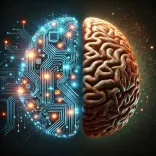The Power of the Human Brain vs AI: A Comparison

The human brain is often regarded as the most powerful and complex computing system known to man. For centuries, scientists have sought to understand its vast potential, and recently, the rise of artificial intelligence (AI) has sparked questions about whether machines can one day compare to human intelligence.
The Human Brain: A Marvel of Complexity
The human brain consists of approximately 86 billion neurons. Each of these neurons is connected to thousands of other neurons, creating a vast network of more than 100 trillion synapses. This intricate web allows for highly sophisticated processing, enabling humans to perform an extraordinary range of tasks, from basic motor functions to advanced cognitive abilities like problem-solving, creativity, and emotion.
The sheer scale of the brain’s connections enables complex operations, such as language processing, abstract thought, and memory recall. In comparison, AI systems—though rapidly advancing—still struggle to replicate these general cognitive abilities at the scale of the human brain.
The Brain's Processing Power: Speed, Capacity, and RAM
When we talk about processing power, the brain operates in a vastly parallel manner, meaning multiple tasks are performed simultaneously across its billions of neurons. This approach is different from traditional computers and supercomputers that execute tasks in a more linear fashion.
1. Processing Speed and Capacity
- The brain can process 10^16 bits of information per second, roughly equivalent to 1 quadrillion bits per second. To give some perspective, modern computers operate at a fraction of that speed, with the fastest supercomputers achieving speeds in the petaflop range.
- In terms of raw power, it is often said that the brain's performance could be roughly equated to a 1 exaflop supercomputer (1 exaflop = 1 quintillion calculations per second).
- The brain has an efficient, dynamic processing system that allows it to "learn" and adapt, which is still a major hurdle for AI, especially when it comes to self-improvement and generalization.
2. RAM: Memory and Data Storage
The brain’s RAM can be thought of as its working memory, which stores and manipulates information temporarily. Human working memory is limited in size and duration but is highly efficient. For example, the brain can handle around 7 to 9 pieces of information at any given time in its short-term memory.
While it’s difficult to compare directly to a computer's RAM, estimates suggest that the human brain's memory capacity is around 2.5 petabytes (1 petabyte = 1 million gigabytes). In contrast, modern computers typically have much less RAM, although storage can be expanded considerably. However, the efficiency of the brain's memory system is far superior in terms of speed and versatility.
Comparing the Human Brain with the World's Most Powerful Computers
The race to build the most powerful supercomputers has led to systems capable of performing vast numbers of calculations per second. The largest and fastest computers today are reaching mind-boggling computational speeds. Let's take a look at the comparison between the human brain and the world's leading supercomputers.
Top Supercomputers in the World
- Fugaku (Japan): Currently the world’s most powerful supercomputer, Fugaku can achieve a peak performance of around 442 petaflops (or 442 quadrillion calculations per second). It uses cutting-edge ARM processors and can perform a variety of simulations and calculations at remarkable speeds.
- Summit (USA): Summit, located at Oak Ridge National Laboratory, has a performance capacity of 200 petaflops. It was the fastest computer in the world for several years before being surpassed by Fugaku.
- Sunway TaihuLight (China): This supercomputer is capable of 125 petaflops and has been a key player in scientific simulations and data analysis.
Comparison: While Fugaku is the fastest supercomputer on Earth, it is still far from matching the human brain’s estimated processing power. The brain operates at approximately 1 exaflop, which is about 2.25 times more powerful than Fugaku. In simpler terms, the human brain is roughly 2 to 3 times more powerful than the world’s most advanced supercomputers in terms of computational capacity.
The Power and Energy Efficiency of the Brain vs Computers
One of the most remarkable aspects of the human brain is its energy efficiency. The brain consumes about 20 watts of power, which is a fraction of what even the most powerful supercomputers require. For instance, Fugaku consumes over 28 megawatts of power, which is approximately 1.4 million times more than the human brain. This makes the brain an extraordinary example of energy-efficient processing.
When Will AI Compare to the Human Brain?
While AI continues to evolve at a rapid pace, it remains uncertain when it will truly match the full capabilities of the human brain. Researchers estimate that AI could achieve human-like general intelligence sometime in the next few decades, but predicting an exact timeline is challenging.
- According to some experts, AI could reach human-level intelligence by around 2050, though the path to achieving this is still unclear.
- For AI to compare to the human brain in terms of processing power, it would need to achieve a 1 exaflop performance across a wide range of cognitive tasks, not just specific applications.
- Moreover, AI would need to operate efficiently with similar energy consumption as the brain, which currently uses only 20 watts for its entire processing power.
As AI continues to evolve, it will be interesting to observe how close it can come to matching the complexity and versatility of the human brain. For now, while AI has made impressive progress in specific fields, the human brain remains a benchmark that technology has yet to match.





